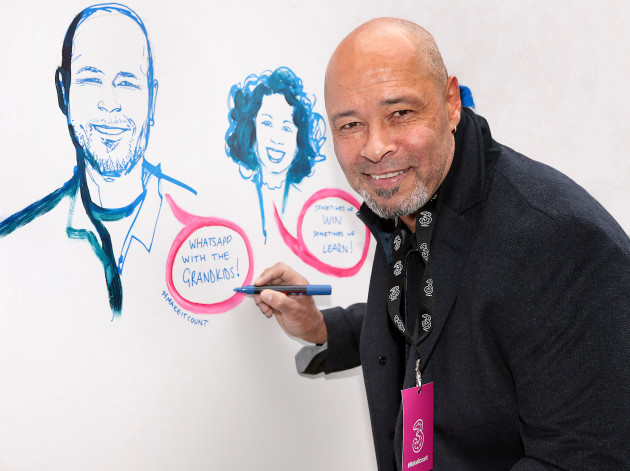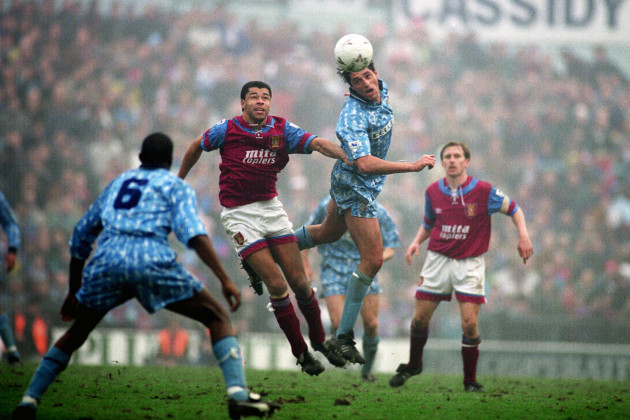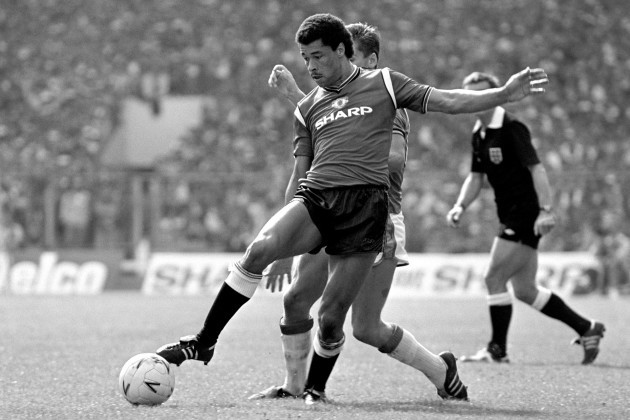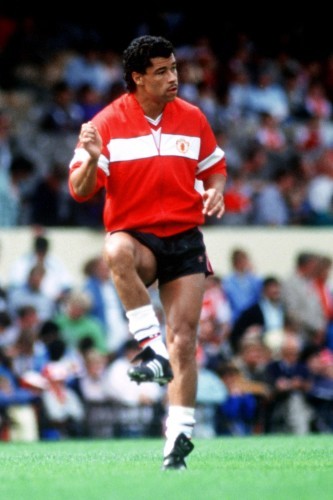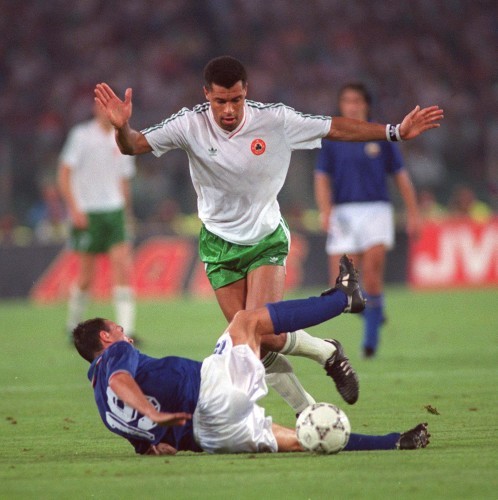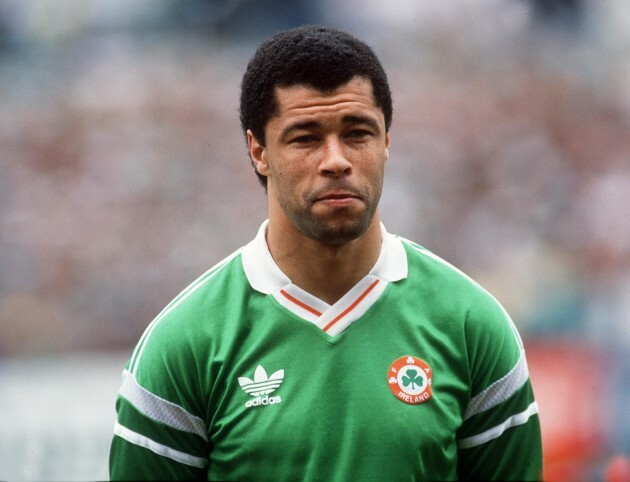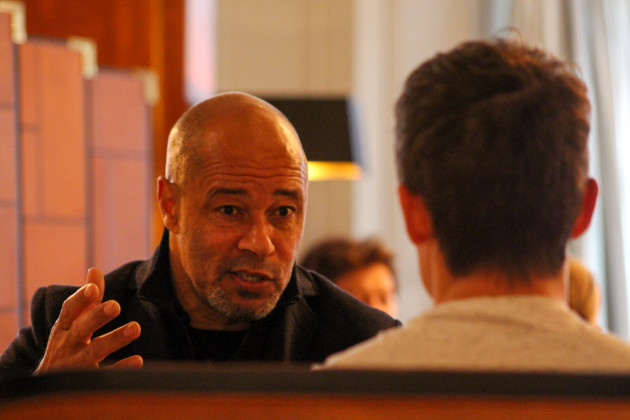FOR THE BENEFIT of this interview, it’s important to add some context first and foremost.
Paul McGrath doesn’t do this very often, nor does he seek any sort of notability or platform. He’s been asked by Three Ireland, who so happen to be the Irish national team’s primary sponsor, to help launch one of their social media campaigns.
The day’s work will help pay a few bills.
So, just after midday on Wednesday we meet for the first time on South King Street in Dublin, where McGrath is finishing off a photocall with some of the brand’s other ambassadors. He looks well and is in good form, happily obliging with any requests for selfies by passersby who get more than they bargained for on their lunch break. ’Jesus lads it’s Paul McGrath,’ broadly encompasses the general reaction.
Shortly after, we relocate to the rather more formal surroundings of The Westbury Hotel, just off Grafton Street, to sit down for a chat. Before the attention is turned on McGrath, he happily deflects it away by marvelling at how it’s the first time he has ever been interviewed by a journalist who never saw him play live, either in person or on TV. I would have been three years old when he was winning the last of his 83 caps for Ireland, although someone of McGrath’s status holds prominence and renown through the generations. He is universally known, liked and admired.
Next year will mark two decades since McGrath brought the curtain down on a storied career which spanned over 17 years, included more than 500 senior appearances and saw him represent Ireland at two World Cups and a European Championship. That’s just the tip of the iceberg, and anyone can appreciate the enormity of his achievements and his standing as one of the finest centre backs to ever grace the English game. Needless to say, one of Ireland’s all-time greats, too.
Now living in Wexford, McGrath last weekend returned to one of the clubs where he left a particularly endearing legacy for the first time in 18 months. This visit to Villa Park — a home away from home — was distinctly emotive, as the 57-year-old was reunited with former team-mates, friends and supporters at a club which helped shape and ultimately define him as a player and a person.
“I don’t get over enough as I’m actually not a good flyer,” he explains to The42, sipping on an Americano, which was very nearly spilled over him when it dawned on the waiter who he was serving.
“I don’t get over as much as I’d love to but there’s certain times I have to make the effort and go over and see everyone. Just to show that I love the club.
“Last season was the first I missed the whole season but this year I’m going to make an effort to get back because I genuinely do love the club. I want them to know that and I’ve to put my feelings about flying to one side and get over when I can. It’s cheap enough for me to fly over and just enjoy it. I love chatting to the people over there as they were so good to me when I was there.”
A schoolboy with Dalkey United and Pearse Rovers, McGrath’s journey to Manchester United and then Aston Villa is well-documented. His story has been told numerous times before, most notably in his remarkable autobiography, ‘Back from the Brink’, but that doesn’t make it any less pertinent or fascinating every time he tells it. His appeal is enduring, even if he doesn’t quite understand it himself.
Humble and shy by nature, McGrath always seemed embarrassed by how well he was regarded as a footballer and even in retirement he struggles to comprehend why, 20 years on, people still put him on such an exalted pedestal — no more so than in Birmingham, where he is worshipped and adored by Villa fans just as much now as when he lined out in the claret and blue.
“It’s a special place, feels like you’re going home,” he continues. “I’ve so many memories at that club. When I left Manchester United, they were one of the clubs who were interested and were willing to take me on. Obviously they had heard of the downsides of bringing me to the club but they were still willing to bring me there. That was a great boost.
“There’s so much respect between them [the supporters] and myself. I’ve been finished football for a number of years but I still have that rapport with the supporters and genuinely do love them. The way they allowed me to get away with some things I shouldn’t have been doing. I should have given them more, I should have given more to the club.”
McGrath’s seven years at Aston Villa coincided with the most troubled period of his career as a very public battle with alcohol was compounded by knee injuries which were so debilitating that he rarely trained with the rest of the squad, the discomfort limiting him to just 10 minutes on the exercise bike each morning to keep him ticking over before Saturday came around.
But McGrath never gave anything less than 100% for every club he played for, even if it meant pushing himself through the pain barrier. He can never hold any regrets over that, but the former St Pat’s defender can’t help but look back on his time at Villa Park with a tinge of guilt.
“There is regret,” he admits. “If I only didn’t do some of the negatives things I was doing, like not showing up for a game or not been a little bit tipsy for games I think we could have come closer to winning a league. There’s always that thing in my mind, but I can’t change anything now. Realistically we could have done better had I maybe not have been so self-absorbed, it’s the only way I can put it.
“But I couldn’t be any more thankful to Aston Villa and everyone at the club. I met Sir Doug Ellis [former club chairman] on Saturday and it was the highlight of my trip. It was him that actually took me from Manchester United and believed enough in me. He believed I was still a good enough player to play for Aston Villa for the next seven seasons. Nobody else would do it, I was out of options. They had heard about my problems and this and that but it was Graham Taylor and Doug Ellis who believed in me.
“That’s what makes Aston Villa the club it is; the people involved from the top right to the bottom. Even the supporters, you get to know them after a while. The staff that work there, they become your friends. The amount of staff I met over there at the weekend was unbelievable as I hadn’t seen them in so long. It’s that kind of thing that makes Villa what it is. You can hug the staff members and catch up on how their kids are doing. I could and should have given the club more at the time.”
Even still, McGrath’s ability to play at the top level for so long was remarkable. Given the demons he was battling and the pain — both physically and mentally — he was enduring, it speaks volumes of his raw, prodigious talent that he was able to prolong his career as long as he did. And also underlines the level of his performances on the field amidst such mayhem off it that he was idolised and revered by supporters rather than repelled.
It was, however, ultimately McGrath’s troubled personality which ended his career at Manchester United with Alex Ferguson deciding that the Irishman was too much hassle for what he was worth as a player.
McGrath’s move to Old Trafford was paved by a single outstanding season in the League of Ireland with St Pat’s, although he had already attracted the attention of Billy Behan, Manchester United’s Irish scout, whilst turning heads during a distinguished schoolboy career with Dalkey.
Having won the PFAI Player of the Year during his sole year (1982) in the Irish domestic league, McGrath instantly worked his way into Ron Atkinson’s plans at United and in 1985 was man of the match in the FA Cup final victory over Everton at Wembley.
But his relationship with Ferguson — who famously took over the reins from Atkinson in 1986 — was turbulent at best and his career trajectory went from going one way to another. The knee issues didn’t help, but Ferguson wasn’t prepared to deal with what was going on in Manchester’s pubs and clubs.
“My first drink…I had it when I was 18 on tour in Germany with Dalkey,” McGrath recalls. “That first night I drank so much I couldn’t remember what had happened the next day, so from then I knew there was a problem. I didn’t drink again until I was 22, but I then did it to excess again.
“When we went to parties in Manchester I used to have a drink beforehand to help myself go to them. I was very shy and I needed that Dutch courage to help me actually go to the party. I would carry on drinking at the party, so I was always ahead of everyone else. I did it because I was shy and lacked confidence.
“People always ask me about Manchester United but there’s no hard feelings there whatsoever. I’m sad I didn’t wait or wasn’t there for the Ryan Giggs or the Paul Scholes or the Roy Keanes because they were just waiting in the wings as I was getting pushed out. I was delighted for Manchester United as they deserved to win the league and many leagues.
“I eventually grew to settle my scores with Sir Alex Ferguson as well because Sir Alex wasn’t trying to make an example of me, he was trying to do the best for Manchester United. I wasn’t going to be in his plans and I knew exactly why I wasn’t going to be in his plans because I was a maverick. I was a raver and did my own thing. He knew I wasn’t going to be in his plans and so did I.”
Ferguson eventually decided enough was enough in 1989 and, at the age of 29, McGrath was offered a pay-off of £100,000 and a benefit game in Dublin if he called it quits and retired. After a meeting with Ferguson, United chairman Martin Edwards and Gordon Taylor of the FA, McGrath knew he couldn’t end it like that. He consulted with Bryan Robson, Kevin Moran and Norman Whiteside and they told him he shouldn’t accept it.
He continues: “They were right and deep in my heart I knew I didn’t want to do it, so I rang Gordon Taylor and told him he could tell them to forget it. I wanted to keep playing. They could throw me out of the club, but there was no way I was quitting the game.
“The only reason I can think of that they wanted me to quit was they didn’t want me going to another club and doing well.”
McGrath left Manchester United thinking Ferguson hated him, and the feeling was mutual. He resented the Scot initially and held a grudge for a number of years after, until Aston Villa ended United’s hopes of winning the domestic treble in 1994.
“It was both of us, for five years we never said a word to each other even when we were playing against each other. I remember when I was with Aston Villa and he was with Manchester United, he’d look at that wall and I’d look at the other, even when we were passing each other in the tunnel.
“But then we beat them at Wembley, I think it was 3-1 in the League Cup final, he came and he shook my hand and belted me in the stomach and said ‘Well done, big man’ and walked off. I took that as ‘Thank God, that’s the end of it now’ because I loved what he was doing for Manchester United but always thought he hated me, he hated me.
“I was wrong, it was just I was acting and doing things that were totally wrong as far as he was concerned and I deserved everything I got. It turns out he was a decent man and five years were wasted of my life disliking him.”
That League Cup victory in 1994 was one of three major honours McGrath won during his time in England, the others being the FA Cup win with United under Atkinson in 1985 and the League Cup again with Villa in 1996. Individually, he was named in the PFA Team of the Year twice and became only the second Irishman after Liam Brady to be crowned PFA Players’ Player of the Year in 1992/93. He was truly one of the finest players of his generation.
Switching between centre back and midfield, McGrath seemed to be one step ahead of everyone else on the pitch as his footballing intelligence, coupled with a wonderfully calm and composed ability on the ball, a formidable aerial prowess and a capacity to time a tackle perfectly meant he was peerless among his generation. There was also a propensity to conjure his best performances when it mattered most, and oftentimes that was in a green jersey. A vulnerable individual off the field, but incredibly reliable on it.
“Jack [Charlton] deserves all the credit,” he says, in typically self-effacing fashion. “Jack brought us to places we could never have dreamed of and to be part of those teams that achieved firsts for Ireland was special. He’s the real hero.
“But I find it amazing that I can still make a living out of football 20 years after I left the game. People are still asking me to do stuff that can make me a few shillings. I’m amazed by that because there are younger players like Robbie Keane who have done just as much and more in my estimation anyway. I think most people recognise a lot of the players who were part of the team in ‘88 and then for the World Cup.
“We were lucky in that respect that we were those players so we can still sit down and tell a story and tell a joke about how things were and people still want to hear those old stories. It’s never going to make us fortunes but I don’t think people need four cars in their driveway, one does me and has done me for quite a number of years. I don’t subscribe to all that stuff about having too much money, you don’t need it.”
Certainly McGrath was happy to retreat into a quiet life once he finished his playing days with Sheffield United in 1998. There was no desire to stay involved in the game, nor was there any inclination to stay in the public limelight, even though his struggles with alcoholism continued into retirement, worsening to such an extent that he was hurtling towards ‘oblivion.’
Thankfully, McGrath has been able to turn things around and has been sober since the start of the year meaning he has more time and energy to devote to his children and grandchildren. Living in Wexford means he doesn’t get to see them as much as he’d like but a cursory glance at his social media accounts highlights the huge part they play in his life.
“Keeping that connection with them all is hard because they’ll come over to me from time to time. With me the way I am, they keep asking me ‘when are we going to go away on holiday?’ but I’m not great flying and not a great one for holidays if truth be known. I live down in the sunny southeast, usually the summers are golfing and if you want to lie on the beach there’s beaches down there. My kids will come over and my grandkids will come over too.
“One of my sons is in Bristol, he has three kids. The others are in Manchester and my daughter is in Essex. With the technology today you can just Skype them and there’s four of them shouting at you at once but it’s all good. We’ve had two of my grandchildrens’ birthdays here in Ireland so we’ve gone out for meals and they want a certain cake and all that kind of stuff. It’s brilliant, I love just being a granddad to them.”
Although he has separated himself from his footballing career in the quaint surroundings of Monageer, McGrath says his grandchildren are beginning to become aware of their grandfather’s past.
He explains: “When we’re out someone might come up and ask me for an autograph or photograph. They find it a little bit strange if people come up during the meal but I don’t refuse anyone. Anybody who asks for an autograph or photograph will always get one. I’m the privileged one to be asked after this length of time. That’s a privilege.
“In a day you might get five or six people asking you so it’s not a hard life. There’s loads of people who I meet who say ‘I saw you walking into Arnott’s or whatever and I was going to ask you but..’ and I always just say if you want a photo come up and say hello and we’ll have a chat about football. I love that I have been part of the Irish football scene and I love watching the kids develop. The likes of Richard Dunne, I mainly watch the centre-halves to be honest, but you can’t miss the Robbie Keanes and Damien Duffs. They’re class acts. We’re lucky to have those sorts of players play for Ireland.”
A heroic, iconic figure in a green jersey, McGrath is rightly considered among the pantheon of Irish footballing, and sporting, greats, although he’d never put himself in that bracket. It’s hard to think of a more universally liked sportsperson, who served this country with as much distinction as McGrath did. His performances at Euro ’88, Italia ’90 and USA ’94 will forever be etched in Irish sporting folklore.
“I put Robbie above [me] for starters. It’s a lot easier for me to block a goal than it is for Robbie to score. I’d love to think say in 10/20 years and there’s an Irish team or something, I’d love to think I’d sneak in there but I know for a fact Robbie Keane will be in there. The hardest part of football is finishing and one of the simplest parts is making a tackle. Robbie Keane, I had to play against him once and he turned me inside out. He was only 17 and I was just about to quit and he ran me ragged. The only consolation that day was he was Irish. I love the kid now, I meet him all the time and he deserves everything he gets. He’s up there with Liam Brady, John Giles, Ronnie Whelan, Roy Keane.
“But I do feel lucky to have played football, it was a real honour but that was then. I love my quiet life now. It’s absolutely brilliant in Wexford, I love being down there. It can be quiet and then someone will come for a visit and you have to get out and do things. I don’t mind meeting people and when I am out in the town I’ll say hello to everyone. I do like the company. I do a lot of walking and play golf but my knees still aren’t great but I have to get them both done at some stage. They’re not killing me at the moment which is good.”
While McGrath has removed himself from football to a certain extent, the game remains an intrinsic part of him. He’ll never lose that love of it, nor the passion he played with — even if he has to channel that slightly differently while watching from the couch or the stands.
He was in attendance at the Aviva Stadium on Friday night as Ireland kept their World Cup bid alive with victory over Moldova, and is a regular at home games with the trip to Dublin offering him a social outlet to catch up with familiar faces as much as anything else.
Then, there is also these commercial opportunities every so often to supplement his income on top of the occasional corporate event he’s invited to speak at. It’s not a lot, but keeps him afloat.
“I try to earn a little bit of money because other than that I’m not a wealthy human being. I have to earn a living. I have presents to buy at Christmas for my children and grandkids, not huge things but things I have to worry about. I’m glad to come up and do things like this, I still need to pay bills and it’s lovely for me to be asked to do something like that.
“I’m delighted that people are still interested in me, I can’t remember how many years since I’ve kicked a ball. It’s been a right few. It’s actually ridiculous to think I can still get work 20 years after I kicked a ball and there’s loads of ex-players that can’t. Certain people for whatever reason like you and for whatever reason I’m lucky to be able to do that.”
He might try and downplay it himself, but the reasons for his enduring relevance are patently obvious. McGrath is class personified, an absolute gentleman whose modest and unassuming personality defies everything he achieved as a player.
Before he hits the road for home, it would be remiss of us to skim over what is a huge few days for Irish football, on this of all weekends, with the hopes of a nation now resting on the outcome of Monday’s make-or-break qualifier in Cardiff. McGrath, like the rest of us, will be glued to his TV, praying for a positive result and hoping for another memorable night for Martin O’Neill’s men.
“When you leave the team, it is one of the hardest things because retirement hits you like a brick but it comes to everyone and you have to understand that. You just go back to being an Irish supporter and now I love supporting Ireland in everything; in rugby, football, hockey, the Women’s Rugby World Cup, the Olympics. I watch everything and it’s about Ireland, not about any other country. It’s just Ireland. I grew up that way and in ‘85 when I pulled on that jersey it was as proud as you can get. It doesn’t get any better than that and I see things in this team that makes me believe we can do it.
“I see the fighting spirit, the passion. In James McClean and players like that you see the raw, Irish hunger for winning. The will to win for Ireland, that’s what it’s all about. He epitomises everything about Irish players, he wants to win and shows that in every fibre of his body. I love that, I love that about every single Irish footballer or sportsperson; they go out to win but they go out with a pride and passion for their country.”
And that was one of McGrath’s greatest assets.
“When I was in any way a good shape I gave 110%, the supporters do love a player who does that and I’m the same now,” he adds. “I gave everything. I went into challenges fairly, gave everything and was a fair-minded player.
“I’m delighted with everything that happened. It couldn’t have worked out better for me. I had a wonderful time playing for Ireland, for Manchester United, for Aston Villa, for Derby, for Sheffield United, for St Pat’s, for Dalkey and for Pearse Rovers. Every club I went to I did my best for. I walked away from football happy that I did my best.”
As we stand up and head our separate ways, I thank McGrath for his generous time and the honesty and openness in which he had spoken for the preceding 40 minutes.
His final words are as revealing as anything that has gone before.
“No, the pleasure was absolutely all mine.”
A true measure of the man, an Irish legend.
Subscribe to The42 podcasts here:
